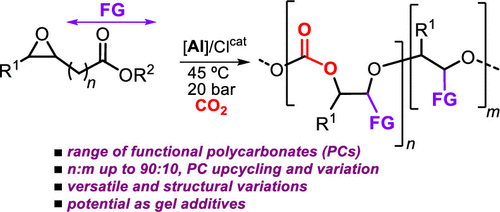Access to Functionalized Polycarbonates derived from Fatty Acid Esters via Catalytic ROCOP and their Potential in Gel Formulations
Fatty acid epoxides and carbon dioxide have been used as monomers to create functional polycarbonate macromolecules using catalytic ring-opening copolymerizations, providing molecular weights of up to 18.5 kg/mol under controlled conditions. The functionality in these polycarbonates can be controlled via either the pendent ester groups or using additional (functional) epoxy monomers, thereby creating terpolymeric compositions with cross-linkable or polarity-changing fragments. Potential depolymerization and upcycling of the polycarbonate atoms were investigated, allowing repurposing of the initial macromolecule into a bifunctional diurethane-diester monomer in good yield. The prospect of using bioderived polycarbonates as additives in biogel formulations was evaluated, showing it to improve the mechanical and adsorption properties of castor oil-based polyurethane gels.

Brandolese, A.; Lamparelli, D. H.; Grimaldi, I.; Impemba, S.; Baglioni, P.; Kleij, A. W.
Macromolecules 2024, 57 (8), 3816–3823
DOI:
10.1021/acs.macromol.4c00411

Let's create a brighter future
Join our team to work with renowned researchers, tackle groundbreaking
projects and contribute to meaningful scientific advancements




















